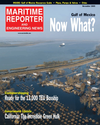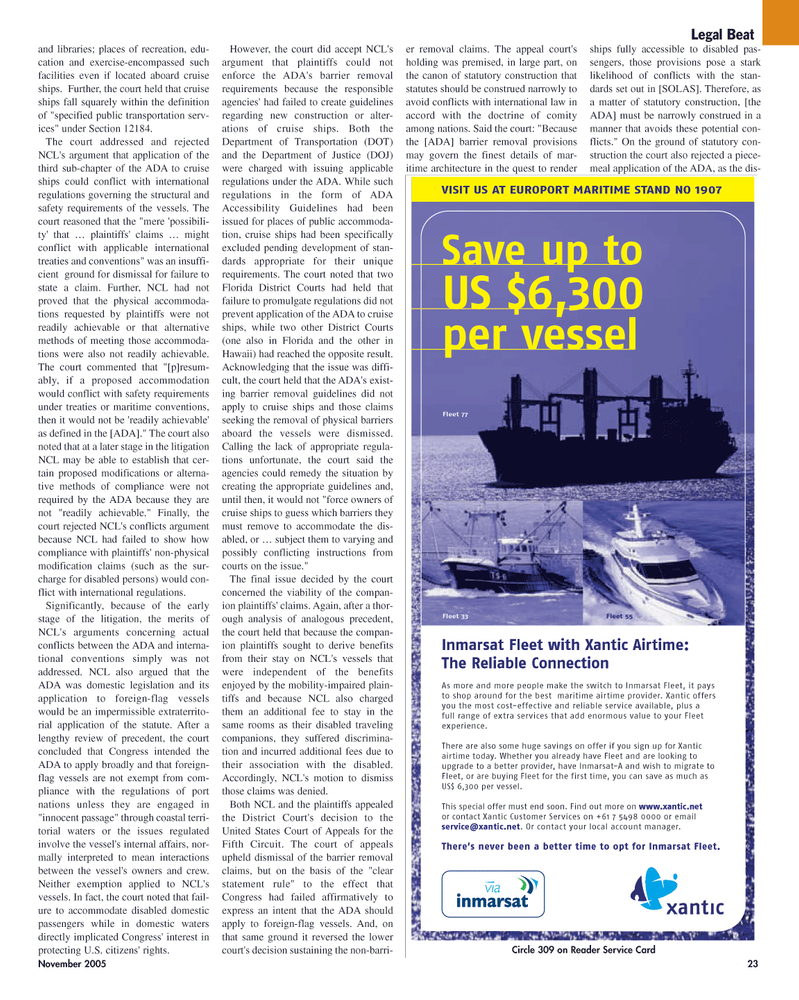
Page 23: of Maritime Reporter Magazine (November 2005)
The Workboat Annual Edition
Read this page in Pdf, Flash or Html5 edition of November 2005 Maritime Reporter Magazine
November 2005 23 and libraries; places of recreation, edu- cation and exercise-encompassed such facilities even if located aboard cruise ships. Further, the court held that cruise ships fall squarely within the definition of "specified public transportation serv- ices" under Section 12184.
The court addressed and rejected
NCL's argument that application of the third sub-chapter of the ADA to cruise ships could conflict with international regulations governing the structural and safety requirements of the vessels. The court reasoned that the "mere 'possibili- ty' that … plaintiffs' claims … might conflict with applicable international treaties and conventions" was an insuffi- cient ground for dismissal for failure to state a claim. Further, NCL had not proved that the physical accommoda- tions requested by plaintiffs were not readily achievable or that alternative methods of meeting those accommoda- tions were also not readily achievable.
The court commented that "[p]resum- ably, if a proposed accommodation would conflict with safety requirements under treaties or maritime conventions, then it would not be 'readily achievable' as defined in the [ADA]." The court also noted that at a later stage in the litigation
NCL may be able to establish that cer- tain proposed modifications or alterna- tive methods of compliance were not required by the ADA because they are not "readily achievable." Finally, the court rejected NCL's conflicts argument because NCL had failed to show how compliance with plaintiffs' non-physical modification claims (such as the sur- charge for disabled persons) would con- flict with international regulations.
Significantly, because of the early stage of the litigation, the merits of
NCL's arguments concerning actual conflicts between the ADA and interna- tional conventions simply was not addressed. NCL also argued that the
ADA was domestic legislation and its application to foreign-flag vessels would be an impermissible extraterrito- rial application of the statute. After a lengthy review of precedent, the court concluded that Congress intended the
ADA to apply broadly and that foreign- flag vessels are not exempt from com- pliance with the regulations of port nations unless they are engaged in "innocent passage" through coastal terri- torial waters or the issues regulated involve the vessel's internal affairs, nor- mally interpreted to mean interactions between the vessel's owners and crew.
Neither exemption applied to NCL's vessels. In fact, the court noted that fail- ure to accommodate disabled domestic passengers while in domestic waters directly implicated Congress' interest in protecting U.S. citizens' rights.
However, the court did accept NCL's argument that plaintiffs could not enforce the ADA's barrier removal requirements because the responsible agencies' had failed to create guidelines regarding new construction or alter- ations of cruise ships. Both the
Department of Transportation (DOT) and the Department of Justice (DOJ) were charged with issuing applicable regulations under the ADA. While such regulations in the form of ADA
Accessibility Guidelines had been issued for places of public accommoda- tion, cruise ships had been specifically excluded pending development of stan- dards appropriate for their unique requirements. The court noted that two
Florida District Courts had held that failure to promulgate regulations did not prevent application of the ADA to cruise ships, while two other District Courts (one also in Florida and the other in
Hawaii) had reached the opposite result.
Acknowledging that the issue was diffi- cult, the court held that the ADA's exist- ing barrier removal guidelines did not apply to cruise ships and those claims seeking the removal of physical barriers aboard the vessels were dismissed.
Calling the lack of appropriate regula- tions unfortunate, the court said the agencies could remedy the situation by creating the appropriate guidelines and, until then, it would not "force owners of cruise ships to guess which barriers they must remove to accommodate the dis- abled, or … subject them to varying and possibly conflicting instructions from courts on the issue."
The final issue decided by the court concerned the viability of the compan- ion plaintiffs' claims. Again, after a thor- ough analysis of analogous precedent, the court held that because the compan- ion plaintiffs sought to derive benefits from their stay on NCL's vessels that were independent of the benefits enjoyed by the mobility-impaired plain- tiffs and because NCL also charged them an additional fee to stay in the same rooms as their disabled traveling companions, they suffered discrimina- tion and incurred additional fees due to their association with the disabled.
Accordingly, NCL's motion to dismiss those claims was denied.
Both NCL and the plaintiffs appealed the District Court's decision to the
United States Court of Appeals for the
Fifth Circuit. The court of appeals upheld dismissal of the barrier removal claims, but on the basis of the "clear statement rule" to the effect that
Congress had failed affirmatively to express an intent that the ADA should apply to foreign-flag vessels. And, on that same ground it reversed the lower court's decision sustaining the non-barri- er removal claims. The appeal court's holding was premised, in large part, on the canon of statutory construction that statutes should be construed narrowly to avoid conflicts with international law in accord with the doctrine of comity among nations. Said the court: "Because the [ADA] barrier removal provisions may govern the finest details of mar- itime architecture in the quest to render ships fully accessible to disabled pas- sengers, those provisions pose a stark likelihood of conflicts with the stan- dards set out in [SOLAS]. Therefore, as a matter of statutory construction, [the
ADA] must be narrowly construed in a manner that avoids these potential con- flicts." On the ground of statutory con- struction the court also rejected a piece- meal application of the ADA, as the dis-
Circle 309 on Reader Service Card
Fleet 55
Fleet 77
Inmarsat Fleet with Xantic Airtime:
The Reliable Connection
As more and more people make the switch to Inmarsat Fleet, it pays to shop around for the best maritime airtime provider. Xantic offers you the most cost-effective and reliable service available, plus a full range of extra services that add enormous value to your Fleet experience.
There are also some huge savings on offer if you sign up for Xantic airtime today. Whether you already have Fleet and are looking to upgrade to a better provider, have Inmarsat-A and wish to migrate to
Fleet, or are buying Fleet for the first time, you can save as much as
US$ 6,300 per vessel.
This special offer must end soon. Find out more on www.xantic.net or contact Xantic Customer Services on +61 7 5498 0000 or email [email protected]. Or contact your local account manager.
There’s never been a better time to opt for Inmarsat Fleet.
Fleet 33
Save up to per vessel
VISIT US AT EUROPORT MARITIME STAND NO 1907
Adv Xantic Fleet 114x254.indd 1 28-09-2005 10:18:50
Legal Beat
US $6,300
MR NOVEMBER 2005 #3 (17-24).qxd 10/28/2005 9:36 AM Page 23

 22
22

 24
24
